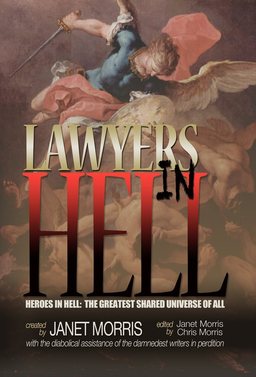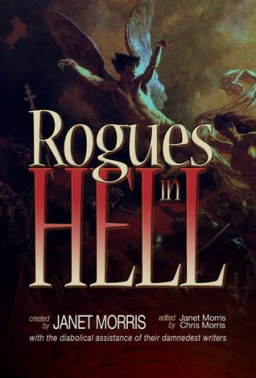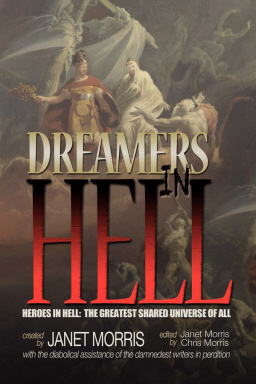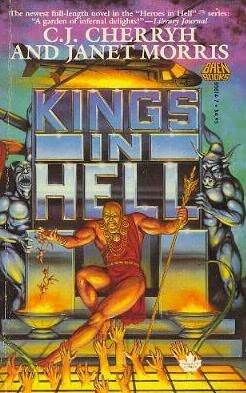The Devil in the Details: A Review of Lawyers in Hell
 Lawyers in Hell (Heroes in Hell, Volume 12)
Lawyers in Hell (Heroes in Hell, Volume 12)
Created by Janet Morris, edited by Janet and Chris Morris, and written “with the diabolical assistance of the damnedest writers in perdition.”
Perseid Press (456 pages, June 8, 2011, $19.95 in trade paperback)
This is volume twelve in the most clever and interesting shared-universe series I’ve ever had the pleasure to read. Lawyers in Hell actually precedes Rogues in Hell and Dreamers in Hell, both of which I previously reviewed here. And like those other volumes, this one is also outstanding. So let me start off with a bit of info on what’s going on this time around in Hell, among the characters drawn from the pages of history, legend, folklore, and mythology.
Hell is a twisted, ironic echo of life on Earth. Here the mighty have fallen, though they retain some delusion of grandeur. Here the lowly have risen in rank, though they are no more than toys for Satan to play with. Everyone in Hell is HSM’s (His Satanic Majesty’s) pawn, his puppet.
Erra is the Babylonian god of mayhem and plague, and rumors of Erra and his 7 Sibitti enforcers running amok in Hell are spreading like hellfire. They have been sent by Heaven to audit Hell, to enforce punishment equally. They are there to make damned sure that every damned soul in Hell “receives injustice justly. Or something like that,” to quote author Nancy Asire. “Lawyers are shaking in their boots or salivating over their opportunities.”
As the title of this volume suggests, each story/chapter revolves around legal battles being fought, court cases being heard, and lawsuits being drawn up. Everyone in Hell wants out of Hell and the damned are going through whatever legal system there can be said to exist in Hell. Where’s Perry Mason when you need him? I don’t think he’s in Hell. Not yet, at any rate.
“Interview with the Devil,” by Janet and Chris Morris, begins with William Safire interviewing Satan for the New Hell Times Sinday Magazine. The topic of this interview: What does it mean to the citizens of Hell that HSM and all the lords of Hell are being audited by Erra and his 7 Sibitti to determine whether or not injustice is being fairly dispensed to all? Safire also wants to know if there is any truth to the rumors that there will be new appeals and hearings for those damned who feel they’ve been unjustly condemned to Hell. Naturally, every damned soul in Hell claims to have been sent there unjustly. Safire presses Satan even further, asking him to confirm or deny the rumor that there is a Get Out of Hell Free card somewhere in Hell. The Devil tells him where it is and tells him where he can go to look for it, if you catch my drift. The interview proceeds and Safire continues to irk Satan. What happens to Richard Nixon’s former speechwriter is, in Hell, justice served. To quote His Satanic Majesty: “In Hell, Safire, all punishments fit the sins.”
 In Janet Morris’s clever and intriguing “Tribe of Hell,” we again meet Kur, leader of the Kigali, and his apprentice/lover, young Eshi. The Kigali is a tribe of demons indigenous to Hell. They were in Hell before all others, before the Fall of Lucifer and his rebellious angels, and they will be in Hell after all others are gone. They tolerate the Fallen Angels, cooperate with Heaven, but are no friend to the damned. Now, Erra and his 7 Sibitti have been attacking the damned near the Gates of Hell, dispensing punishment as they see fit. Later they march on Ki-gal, where they are hosted and feasted by Kur. Eshi then strikes up a friendship with one of the Sibitti, after earning the respect of Erra. Meanwhile, General Lysicles appeals to Erra and the Seven, hoping to have his sentencing in Hell overturned. Lysicles, if you recall, led many a brave, good Athenian to his death when they went up against a certain great general from Macedonia named Alexander. Hammurabi and Draco, First Legislator of Athens in Ancient Greece, have agreed to represent Lysicles. It’s anyone’s guess how this case is going to play out in court.
In Janet Morris’s clever and intriguing “Tribe of Hell,” we again meet Kur, leader of the Kigali, and his apprentice/lover, young Eshi. The Kigali is a tribe of demons indigenous to Hell. They were in Hell before all others, before the Fall of Lucifer and his rebellious angels, and they will be in Hell after all others are gone. They tolerate the Fallen Angels, cooperate with Heaven, but are no friend to the damned. Now, Erra and his 7 Sibitti have been attacking the damned near the Gates of Hell, dispensing punishment as they see fit. Later they march on Ki-gal, where they are hosted and feasted by Kur. Eshi then strikes up a friendship with one of the Sibitti, after earning the respect of Erra. Meanwhile, General Lysicles appeals to Erra and the Seven, hoping to have his sentencing in Hell overturned. Lysicles, if you recall, led many a brave, good Athenian to his death when they went up against a certain great general from Macedonia named Alexander. Hammurabi and Draco, First Legislator of Athens in Ancient Greece, have agreed to represent Lysicles. It’s anyone’s guess how this case is going to play out in court.
In “The Rapture Elevator,” a rousing yarn by Michael Armstrong, we find Scotsman Kinmont Willie plotting to ride the golden beam of the Rapture Elevator like a bat out of Hell — straight up to Heaven. Willie needs a good lawyer to get him acquitted of the burning of the Widow Bell in 1596 — a woman he claims was already dead at the time of the incident in question, hacked to pieces by agent or agents unknown. At an oasis, Willie meets up with old friend Thomas Armstrong, alias Ringan’s Tam, who has hired a good lawyer called Dick of the Side, otherwise known as Richard Nixon. Job the Ombudsman has agreed to back the witnesses subpoenaed by the defense. Job, who is not tormented in Hell, has chosen his infernal fate. He could be in Heaven but, well… it’s complicated. Will Kinmont Willie be found innocent? Or will he be found not innocent enough?
In New Hell, most of the high-ranking nobles of Ancient Rome have the best of all possible hells, having carved out their own private little Elysium. And so C.J. Cherryh’s hilarious “Out of Court Settlement” opens with Augustus Caesar in a dither — but looking young again! — because Caesarion and Brutus (teenage rebels in Hell who wear leather jackets and listen to rock and roll) have burgled the villa of Tiberius. In the meantime, while Niccolo Machiavelli trims roses in the rain, Dante Alighieri is in Caesar’s basement doing research to help in his petition to get out of Hell. Poor Augustus, beset on all sides, twisted and pulled in all directions; he knows all too well that in Hell, you’re guilty until proven innocent. Caesarion and Brutus face arrest and lawsuit, and probably a trip to Slab A in the Mortuary for reassignment, if they are not just cut up and left in viable pieces.
 “Tale of a Tail” is Nancy Asire’s entertaining look into the afterlives of Napoleon and Marie Walewska, his mistress in life who has chosen to be in Hell with him. It seems that objects in their estate keep growing legs and relocating to places other than where they had been previously set down. Napoleon’s one-time foe in life but good friend in Hell, Wellington, is obsessed with his lawn. The Homeowner’s Association of Hellview Estates clearly states that any lawn may not be more than 2 inches high. Wellington is beside himself with anxiety — his lawn just keeps growing faster and faster overnight! There’s also a problem with their new neighbor, who is so obviously not human. At the monthly dinner at the Hellfire Club, the three friends appeal to the president of their Homeowner’s Association to do something about their neighbor. Added to all this is the recurring vandalism in the neighborhood — Are the perps the sons of Attila the Hun? — and the crazy Viet Cong who can only be bribed with ribs. Oh, did I fail to mention Erra and rumors of his 7 Sibitti?
“Tale of a Tail” is Nancy Asire’s entertaining look into the afterlives of Napoleon and Marie Walewska, his mistress in life who has chosen to be in Hell with him. It seems that objects in their estate keep growing legs and relocating to places other than where they had been previously set down. Napoleon’s one-time foe in life but good friend in Hell, Wellington, is obsessed with his lawn. The Homeowner’s Association of Hellview Estates clearly states that any lawn may not be more than 2 inches high. Wellington is beside himself with anxiety — his lawn just keeps growing faster and faster overnight! There’s also a problem with their new neighbor, who is so obviously not human. At the monthly dinner at the Hellfire Club, the three friends appeal to the president of their Homeowner’s Association to do something about their neighbor. Added to all this is the recurring vandalism in the neighborhood — Are the perps the sons of Attila the Hun? — and the crazy Viet Cong who can only be bribed with ribs. Oh, did I fail to mention Erra and rumors of his 7 Sibitti?
Jason Cordova delivers with “And Injustice for All,” his wonderful tale of Marie Antoinette, Henrietta Maria, once consort to King Charles the First, and the decapitated but still very much alive and talking head of Rasputin, whose head was purchased from Prophecy Dolls, LLC.
Because Marie had asked Rasputin for advice on how to move into a place befitting her status, she and Henrietta now have to move from their current dump into a worse dump in Unwelfare Housing. Poor girl! She hasn’t learned to be careful of what you ask of the Mad Monk. Previously, Maria had asked him how she might become popular. His answer: “Let them eat cake.” She is still pulling cake out of every crevice of her body — and none of the damned aristocrats will take her calls! So she decides to sue Prophecy Head Dolls, LLC for false advertising and breach of contract. But as Rasputin reminds her, they take no responsibility for the actions taken by a customer based on their interpretation of a prophecy.
Next on the docket is Deborah Koren’s hellacious little western, “Measure of a Man.” Attorney Alan Bensinger awakens to gunshots after his visit to Slab A in the Mortuary and finds Bat Masterson in his room. Masterson tells Bensinger that Wyatt Earp has need of a lawyer because one Harry Piper claims that Earp’s faro tables are rigged. In life, Bensinger was one hell of a dishonest attorney. Now in Hell, Bensinger’s curse is that as long as he lies in court, he wins. Bensinger also meets and falls in love with songbird Sally Lockett, who must perform in Puccini’s The Girl of the Golden West every night, over and over and over again. When Sally is accused of Puccini’s murder, she begs Bensinger to defend her, knowing that if he lies, he wins and she goes free. But Bensinger has been examining his previous life, as well as his afterlife in Hell and has a dilemma: will he lie so the gal he loves gets off scott free? Or will his conscience win out and he resort to honesty, which might not be such a good thing for Sally?
 In “The Adjudication of Hetty Green,” Allan F. Gilbreath’s clever little examination into the process of legal claims, we join one-time Chicago gangland mouthpiece Edward “Eddie” J. O’Hare, Esquire. He works at the Office of Adjudications, New Hell Branch. He’s been called upon to defend one Henrietta “Hetty” Green, the Witch of Wall Street, who has various claimants demanding her soul for punishment. Environmental Services wants Hetty’s soul because her family first made their fortune through whaling — a perfect example of wanton pillage of natural resources. Family Avarice Department demands retribution because in life, Hetty lied, cheated, and stole from her family. The Tactical Profiteering Department wants to punish Hetty because she made millions of dollars when her country was in dire financial straits. With eloquent legalese and the cunning of a fox with a degree in law from Harvard, Eddie shuts down every claimant. But in a final, ironic twist, Eddie finds himself in a courtroom hot seat.
In “The Adjudication of Hetty Green,” Allan F. Gilbreath’s clever little examination into the process of legal claims, we join one-time Chicago gangland mouthpiece Edward “Eddie” J. O’Hare, Esquire. He works at the Office of Adjudications, New Hell Branch. He’s been called upon to defend one Henrietta “Hetty” Green, the Witch of Wall Street, who has various claimants demanding her soul for punishment. Environmental Services wants Hetty’s soul because her family first made their fortune through whaling — a perfect example of wanton pillage of natural resources. Family Avarice Department demands retribution because in life, Hetty lied, cheated, and stole from her family. The Tactical Profiteering Department wants to punish Hetty because she made millions of dollars when her country was in dire financial straits. With eloquent legalese and the cunning of a fox with a degree in law from Harvard, Eddie shuts down every claimant. But in a final, ironic twist, Eddie finds himself in a courtroom hot seat.
Let’s now ride on over to the “Plains of Hell,” Bruce Durham’s rousing yarn featuring James G. Wolfe, former general in the army of King George II. Wolfe, still afflicted in death with “consumption,” walks into a tavern in New Hell where he encounters John Churchill, Duke of Marlborough, and Prince Eugene of Savoy, the two greatest generals of their time. They’re discussing the many battles they won and lost. Wolfe buys them a round of drinks and joins in the discussion about the numbers and details of casualties. Wolfe is then served a subpoena by a sexy succubus. His former foe in life, the Marquis Louis-Joseph de Montcalm, is requesting a trial. The charge: Wolfe cheated his way to victory at the battle on the Plains of Abraham. Judge Roy Bean presides over the case and decides that Wolfe and Montcalm will refight the battle there, in the netherworld, on the Plains of Hell. What happens next is a military secret about which I am not at liberty to discuss.
Michael H. Hanson’s “The Register” is a nice, sting-like con game. Alistair Chrysler Smith is a field agent for the Hell Registry of Preeminently Damned Lawyers. This means he can leave Hell and visit Earth to rate law clerks, judges, and attorneys who may be potential recruits for the HRPDL when they arrive in Hell. At a restaurant in New Jersey he meets Gefjon, a Satanic Judgment Councilor, who is a succubus from Hell. She wants in on his scheme to corrupt the system and use it to his own advantage. Once back in Hell, however, he ends up sitting before the six demons that comprise the Hell Register Ratings Review Committee, who know of his activities and are determined to bring him down. But he in turn accuses the demons of corruption and abusing their power. Smith records the proceedings and then all Hell literally breaks loose.
“Island Out of Time” is Richard Groller’s wild-ride through Hell, where the fabric of Infernal Time has become unstable. A damned soul named Nichols is sent to the Oracle of Delphi to learn the source of the time perturbations. But something goes horribly wrong: when the Oracle peers into Infinity, she goes stark raving mad and Nichols is forced to kill her. Back in New Hell, Nichols has Achilles fly him in a Huey Cobra to the Infernal Observatory on Mount Sinai. There, Zeno of Elea and his friend Pythagoras are already at work on the problem at the Dept. of Apparent Time. The answer to the problem may be found on a strange island called Onogoroshima — an opening between worlds — that may lead to a new world, a new dimension, and perhaps a way out of hell. Throw in Houdini, the battleship Yamato, and a team of Special Ops, and you’re drawn into an attempt to pull off the greatest escape in the history of Infernity.
 “Appellate Angel,” Edward McKeown’s clever courtroom scenario, features Arkiel the Angel doing some time in Hell for having carnal knowledge of humans and demons on Earth. He works in the Hall of Injustice and his latest case is prosecuting an Aztec priest named Huemac, who sacrificed 4,114 men, women, and children to his gods. Yoko, one of Hell’s highest-ranking demons and defense attorneys, is appealing Huemac’s sentence, trying to get a lesser punishment by having the severity of his crimes lessened. The case is argued around whether or not Huemac is guilty or a victim of an inherited religion and a primitive society that did not know any better. Arkiel’s argument, to put it briefly, is all about free will: “While many have claimed the mantle of Heaven to exonerate their actions, Heaven denies them.” Meanwhile, all during the hearing, Yoko’s sexy assistant keeps torturing Arkiel, sparking his desire. In Hell for the sin of lust, Arkiel fears that his “impure” thoughts will keep adding to his time in Hell.
“Appellate Angel,” Edward McKeown’s clever courtroom scenario, features Arkiel the Angel doing some time in Hell for having carnal knowledge of humans and demons on Earth. He works in the Hall of Injustice and his latest case is prosecuting an Aztec priest named Huemac, who sacrificed 4,114 men, women, and children to his gods. Yoko, one of Hell’s highest-ranking demons and defense attorneys, is appealing Huemac’s sentence, trying to get a lesser punishment by having the severity of his crimes lessened. The case is argued around whether or not Huemac is guilty or a victim of an inherited religion and a primitive society that did not know any better. Arkiel’s argument, to put it briefly, is all about free will: “While many have claimed the mantle of Heaven to exonerate their actions, Heaven denies them.” Meanwhile, all during the hearing, Yoko’s sexy assistant keeps torturing Arkiel, sparking his desire. In Hell for the sin of lust, Arkiel fears that his “impure” thoughts will keep adding to his time in Hell.
The next case on the docket is David L. Burkhead’s “With Enemies Like These,” a great read starring American jurist Oliver Wendell Holmes, Jr. and Lieutenant Colonel William Dunlap Simpson of the 14th South Carolina Volunteers. Both men are looking for a way out of Hell and find themselves traversing the frozen realm known as Niffelheim. They encounter Nidhogg, the World Serpent from Old Norse myth, who agrees to lend them a guide, if they can best the snake in a game of questions. Oddly, only Holmes can understand Nidhogg and needless to say, beats the serpent at his own game. Holmes and Simpson are then given for a guide one Vafthruthnir, a decapitated giant who carries his head in his arms. And thus begins their strange journey across the lowest and coldest depths of Scandinavian hell.
In Kimberly Richardson’s clever little court case, “The Dark Arts,” famed attorney Clarence Darrow is called on to defend Penemue, the Fallen Angel who gave man the use of ink and paper. Penemue is being sued for plagiarism by one John Ginger, a struggling writer living in Lost Angeles who can’t afford a computer and writes with a quill pen, and in his own blood. He claims that all his work was stolen by Penemue. But now Penemue wants a change of venue, not a public trial at the Hall of Injustice. Ginger’s attorney, however, a man named Boulder, wants Penemue tried in a public forum or else an admission of guilt and a settlement out of court. In a sudden turn of events that surprises Clarence Darrow, the Fallen Angel decides to admit his guilt — even though he claims he’s innocent — in order to prove how wrong his adversaries are. Does he have something up his sleeve? The jury is still out on that.
 Next we join Captain Joseph “Tail Gunner Joe” McCarthy and Lt. Roger Upton Howard, poet and civil servant, as they parachute into Ashcanistan in Michael Z. Williamson’s action-adventure, “Heads You Lose.” They belong to CLAP: Coordinating Legal Airborne Platoon, whose mission is “to provide the damned with the benefits of a modern legal judgment, and to promote the American way of life.” (Part of the fun of this story is that Satan has decreed that ground transport would be via pogo sticks.) Among the cases they are assigned to hear, one of the most bizarre involves the remaining eight lives of a cat involved in a classless action lawsuit regarding the attempted genocide of mice. But that’s nothing: Satan wants the head of the most honest man in Hell for deposition: Mahatma Gandhi, and dealing with Gandhi is as frustrating as all Hell.
Next we join Captain Joseph “Tail Gunner Joe” McCarthy and Lt. Roger Upton Howard, poet and civil servant, as they parachute into Ashcanistan in Michael Z. Williamson’s action-adventure, “Heads You Lose.” They belong to CLAP: Coordinating Legal Airborne Platoon, whose mission is “to provide the damned with the benefits of a modern legal judgment, and to promote the American way of life.” (Part of the fun of this story is that Satan has decreed that ground transport would be via pogo sticks.) Among the cases they are assigned to hear, one of the most bizarre involves the remaining eight lives of a cat involved in a classless action lawsuit regarding the attempted genocide of mice. But that’s nothing: Satan wants the head of the most honest man in Hell for deposition: Mahatma Gandhi, and dealing with Gandhi is as frustrating as all Hell.
The next case called is Bradley H. Sinor’s clever “Check and Mate.” John Adams, whose wife Abigail, by the way, is not in Hell, is called upon to defend Aleister Crowley for cheating at chess. Crowley is a member of Demon’s Gambit Chess Club and now the club is calling for his resignation. So how does one go about cheating at chess? The only way Crowley could see that happening is via the use of magic — and of course, he claims he’s innocent of all charges. Could someone be using magic against Crowley, using a spell that compels him to cheat? Adams then meets with pulp fiction writer Walter Gibson, who gives him a crash course in stage magic. To find out the verdict, you’ll have to wait for court to convene. The part of Adams’s legal secretary is played by Lieserl Einstein, the daughter of Mr. E=MC2.
“Disclaimer” is John Manning’s interesting legal entry, wherein attorney Aaron “Monty” Montgomery awakens in Hell and is told to report to Melvin Belli. Monty’s job is to listen to each and every nurse, orderly, and administrator, as well as “the families of those unfortunates left to finish out their existence in squalor, indifference, and neglect,” and file reports to Satan for proper resolution. When Monty is offered a position with Hell’s most prestigious law firm, his first assignment is representing Bram Stoker in a defamation of character lawsuit. It seems that Vlad Tepes, aka Prince Drakulya, and Aaron Burr, his attorney, are suing Stoker over the use of the name “Count Dracula.” What Montgomery discovers that he can use to his advantage is something very common to all literary and cinematic works of fiction.
“Orientation Day,” by Sarah Hulcy, is a humorous look at the orientation ceremony for New Dead and damned lawyers. Attorneys Percy Foreman and Melvin Belli hold seminars, lecturing the newbies on the way the law works — and doesn’t work — in Hell. The guest speaker from “Above” is one Mister Justice Benjamin Cardozo, the “lawyer’s lawyer,” who replaced Oliver Wendell Holmes on the U.S. Supreme Court. Cardozo berates the new crop of attorneys for manipulating the law to serve their own needs, which earned them their place in Hell. When Belli and Foreman start handing out legal assignments to the new lawyers in Hell, there is a tremendous explosion and the Hall of Injustice begins to collapse. To find out what’s going on, you’ll just have to read for yourselves because I’m under a gag order.
 In “Remember, Remember, Hell in November,” Larry Atchley gives us a nice, Machiavellian little tale. It begins with the hideous torture and death of Guy Fawkes and his subsequent arrival in Hell, where he meets with Satan and learns how he may be able to appeal his case. This is followed by Anton LaVey’s own warm welcome in Hell and how he becomes, most naturally, one of the damned privileged. Judge Roy Bean presides over the case of Fawkes versus Hell, with noted Icelandic lawspeaker Eyjolf Bolverksson defending Fawkes. Meanwhile, LaVey opens a shop, “Hellish Curiosities & Clothiers,” selling such fake items as the Trousers of Turin, holy water from Saint Olaf’s well and the Spear of Longinus, the spear that pierced Christ’s side — which may or may not be fake. Fawkes then meets Eric Blair (aka George Orwell) and Jonathan Swift, and they discuss treason and a possible attack on Hell’s Hall of Injustice. Thus another Gunpowder Plot unfolds. (Remember the explosion from the previous story?)
In “Remember, Remember, Hell in November,” Larry Atchley gives us a nice, Machiavellian little tale. It begins with the hideous torture and death of Guy Fawkes and his subsequent arrival in Hell, where he meets with Satan and learns how he may be able to appeal his case. This is followed by Anton LaVey’s own warm welcome in Hell and how he becomes, most naturally, one of the damned privileged. Judge Roy Bean presides over the case of Fawkes versus Hell, with noted Icelandic lawspeaker Eyjolf Bolverksson defending Fawkes. Meanwhile, LaVey opens a shop, “Hellish Curiosities & Clothiers,” selling such fake items as the Trousers of Turin, holy water from Saint Olaf’s well and the Spear of Longinus, the spear that pierced Christ’s side — which may or may not be fake. Fawkes then meets Eric Blair (aka George Orwell) and Jonathan Swift, and they discuss treason and a possible attack on Hell’s Hall of Injustice. Thus another Gunpowder Plot unfolds. (Remember the explosion from the previous story?)
Now we come to Scott Oden’s heroic fantasy, “Theo Khthonios.” Leonidas and his 300 Spartans dine in Hades after dying defending the narrow pass of Thermopylae. Then comes a herald — one Simonides of Keos, who penned Leonidas’s epitaph — summoning Leonidas to appear before the ephors, the peers of Sparta, who adjudicate claims and render binding judgments in Hades pertaining to acts of war. They act under the auspices of “She Who is the Kore,” who chooses only Spartans for her judges. Who else can offer impartiality in matters of war? The aggrieved come before them and know that their cause will be heard and judged fairly. Simonides then cautions Leonidas to commit to memory the name of one Ephialtes of Trachis, who had betrayed the Spartans to Xerxes. But Leonidas is in for a surprise when he finds himself accused of impiety and murder.
And now we come to the rousing finale and the last case to be heard, “Erra and the Seven,” by Chris Morris. We return to Lysicles the Athenian, who awakens in Erebus, in the realm of Hades — in the shadows between the world of the living and the world of the dead. We also return to Kur and Eshi of the Kigali, and Erra and his Seven Sibitti enforcers from Above, who are looking for Lysicles. After Hecate gives him the water of Memory to drink, Lysicles then remembers how in life he had been tried in Athens and executed for treason while his commanding general, Chares, went free. He remembers losing his appeal to Erra and his 7 Sibitti enforcers, and how they tortured and mutilated him. He remembers the guilty looks on the faces of his lawyers, Hammurabi and Draco, when sentence was passed. He remembers how Alexander of Macedon held him while Erra and his Seven mutilated him, how Aristotle had looked away, and how T.E. Lawrence had muttered an Arabic prayer to a god that would not or could not help him. Most of all, Lysicles remembers his wife and his sons, and vows to pass whatever tests lay before him so he might return to their arms. Never mind that Satan is angry because the damned destroyed the Hall of Injustice, never mind that Erra and the Seven are exacting punishment and destroying all they see fit to destroy — Lysicles is hungry for revenge and nothing in Hell is going to stop him from finding those who betrayed him.
The previous volumes in the Heroes in Hell shared-universe did not disappoint, and neither does Lawyers in Hell. In here, you will find poets and authors, warriors and priests and politicians, whores and knaves, actors, singers and gunslingers, and of course… lawyers. There is something for everyone in Lawyers in Hell — and like the entire series, it is in a class all by itself. Not only are these stories intelligent, well-written, and cleverly crafted, they are cut above genre and style; they are tales drawn from the pages of history and religion, mythology, and folklore. These are stories of human drama and comedy, allegory and fable… stories about three-dimensional, flesh and blood characters, stories that speak of Man’s hopes and dreams… stories of and about the human condition.
[…] of Black Gate no doubt know by now, I have previously reviewed the shared-universe anthologies Lawyers in Hell, Rogues in Hell and Dreamers in Hell, all edited by Janet Morris and Chris […]
[…] Maybe you’ve read the reviews of her novels that I wrote for Black Gate, including my reviews of Lawyers in Hell, Rogues in Hell, and Dreamers in Hell. In 2014 Janet and I collaborated on an article for Black […]
[…] Maybe you’ve read the reviews of her novels that I wrote for Black Gate, including my reviews of Lawyers in Hell, Rogues in Hell, and Dreamers in Hell. In 2014 Janet and I collaborated onan article for Black […]
My God . . . I can’t believe that so many of my reviews and articles are so appreciated by some many readers. Thank you all!